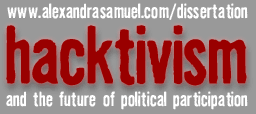|
|
 |
Overview
NEW! Download the dissertation or dissertation chapters!
These web pages were designed as a companion to my dissertation on Hacktivism and the Future of Political Participation, for the Ph.D. in Political Science at Harvard University. This dissertation was supervised by Sidney Verba and Torben Iversen of Harvard University, and Richard Johnston of the University of British Columbia.
The dissertation looks at the phenomenon of hacktivism: the marriage of political activism and computer hacking. It defines hacktivism as the nonviolent use of illegal or legally ambiguous digital tools in pursuit of political ends. These tools include web site defacements, redirects, denial-of-service attacks, information theft, web site parodies, virtual sit-ins, virtual sabotage, and software development.
Based on fifty-one interviews with people who are directly or indirectly involved in hacktivism, the dissertation is the first interview-based study of hacktivists and hacktivist practices. It uses the interview data in conjunction with additional primary and secondary source material to construct a taxonomy of hacktivism, and to apply the taxonomy to three core issues in political participation: the role of identity incentives in driving participation, the transnational politics of policy circumvention, and the aspirations for deliberative democracy online.
The primary purpose of these pages is to make it easy to find the sources mentioned in the dissertation, particularly those that are online. It is not a full listing of all the sources cited in the bibliography, but only of those that are generally available; for this reason it does not include my own interviews.
Additional material will be added to the site in the coming weeks, and the dissertation itself will be available to interview participants (and others on request) once I have completed my defense in September.
Meanwhile, thanks again to the many folks who very generously agreed to speak (or e-mail, or IRC) with me. Meeting this intelligent, engaged and witty collection of people -- virtually or IRL -- was the highlight of this project. Many of them (most of them!) would not describe themselves as hacktivists, but their creativity in combining technology and politics is helping to redefine the way people think about both.
Alexandra Samuel
August 2004